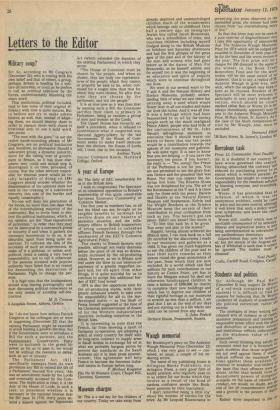Students and politics
Sir: Although Mr Paul Bard (December 8) may suspect Dr B0Ys°1 of a red-neck conspiracy again% students it is difficult to find hlr, reasons for believing that Dr BoYsh,,:; condemns all students of academicae idle political extremism; rather t" reverse. The analogies of letter writing Wirti criminal acts of violence or of carer academic preparation and training l°e responsible public office with the ablts5 and disruption of academic course, and institutions reflects unfavourablYr on the academic value of the promoters.
Such casual thinking may satisfy
tper extremist mind but it is fortunate ilss such students that those argurnen,,tt are not used against them; if stude'; radicals suffered the maximum sa:r tions against them available criminal or academic misconduct the basis that their offences were tre solute, rather than benefit from t"n discretionary powers of mitigatic:s. available on the basis of relative 016'e conduct, .we would, no doubt, see end of the all comprehensive anal°6' and a growth in the powers of discre' tion.
Rather more important is the
sumption that the state subsidised student and university is in the same category as the independently financed student and university. If the public finance academic life to a substantial extent then it follows that it has an undeniable right to know both why and how the money is spent. It is a delusion to deny such a consequence of Public funding for students, however much this is dangerous for our libertarian health or however resented it may be by the growing vested interest in privacy of the academic world. Bearing in mind the considerable sums involved and the alternative Claims available both by the taxpayer and the state upon such largesse, the Justification for non-repayable subsidies is somewhat insubstantial, with the possible exception of matters such as professional training. The major beneficiaries appear to be the recipients of the grants who are thereby allowed to indulge their personal tastes without responsibility and from which they may well benefit for the rest of their lives with little reciprocal benefit to the nation, and Possibly sometimes involving positive harm to the nation. If personal self-indulgence is to be the justification in fact if not in theory then, unless the ail-comprehensive analogy is to be
be again whereby every citizen may oe financed to indulge every personal taste, it is time that the wealth be returned to the tax-payer or a strict loan sYstem be introduced whereby the universities would be restored to their freedom from public involvement and Students would learn the additional Joys of financial responsibility instead °f financial abuse verging on fraudulent misappropriation.
Paul Marland 83 Edith Road, London W14



































 Previous page
Previous page